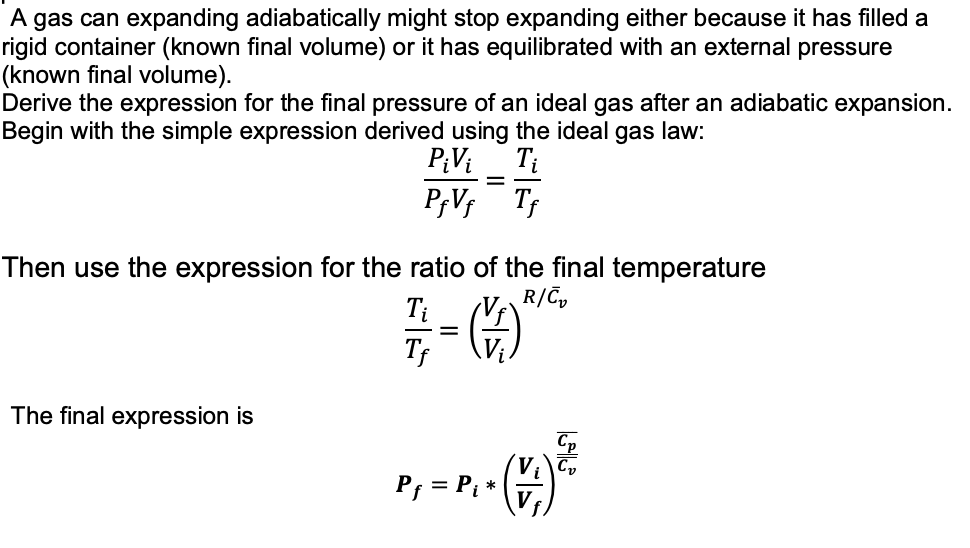A gas can expanding adiabatically might stop expanding either because it has filled a rigid container (known final volume) or it has equilibrated with an external pressure (known final volume). Derive the expression for the final pressure of an ideal gas after an adiabatic expansion. Begin with the simple expression derived using the ideal gas law: PiVi Ti PfVf Tf Then use the expression for the ratio of the final temperature R/C₂ (1) The final expression is Ti Tf Pƒ = P₁ * Cp Vi Cv SIS
A gas can expanding adiabatically might stop expanding either because it has filled a rigid container (known final volume) or it has equilibrated with an external pressure (known final volume). Derive the expression for the final pressure of an ideal gas after an adiabatic expansion. Begin with the simple expression derived using the ideal gas law: PiVi Ti PfVf Tf Then use the expression for the ratio of the final temperature R/C₂ (1) The final expression is Ti Tf Pƒ = P₁ * Cp Vi Cv SIS
Physical Chemistry
2nd Edition
ISBN:9781133958437
Author:Ball, David W. (david Warren), BAER, Tomas
Publisher:Ball, David W. (david Warren), BAER, Tomas
Chapter2: The First Law Of Thermodynamics
Section: Chapter Questions
Problem 2.30E: A piston reversibly and adiabatically contracts 3.88 moles of ideal gas to one-tenth of its original...
Related questions
Question

Transcribed Image Text:A gas can expanding adiabatically might stop expanding either because it has filled a
rigid container (known final volume) or it has equilibrated with an external pressure
(known final volume).
Derive the expression for the final pressure of an ideal gas after an adiabatic expansion.
Begin with the simple expression derived using the ideal gas law:
PiVi Ti
Pf Vf Tf
Then use the expression for the ratio of the final temperature
R/C₂
The final expression is
Ti
Tf
=
=
(1)
Pf = Pi
- (²
*
Expert Solution
This question has been solved!
Explore an expertly crafted, step-by-step solution for a thorough understanding of key concepts.
Step by step
Solved in 2 steps

Knowledge Booster
Learn more about
Need a deep-dive on the concept behind this application? Look no further. Learn more about this topic, chemistry and related others by exploring similar questions and additional content below.Recommended textbooks for you

Physical Chemistry
Chemistry
ISBN:
9781133958437
Author:
Ball, David W. (david Warren), BAER, Tomas
Publisher:
Wadsworth Cengage Learning,

Principles of Modern Chemistry
Chemistry
ISBN:
9781305079113
Author:
David W. Oxtoby, H. Pat Gillis, Laurie J. Butler
Publisher:
Cengage Learning

Chemistry: An Atoms First Approach
Chemistry
ISBN:
9781305079243
Author:
Steven S. Zumdahl, Susan A. Zumdahl
Publisher:
Cengage Learning

Physical Chemistry
Chemistry
ISBN:
9781133958437
Author:
Ball, David W. (david Warren), BAER, Tomas
Publisher:
Wadsworth Cengage Learning,

Principles of Modern Chemistry
Chemistry
ISBN:
9781305079113
Author:
David W. Oxtoby, H. Pat Gillis, Laurie J. Butler
Publisher:
Cengage Learning

Chemistry: An Atoms First Approach
Chemistry
ISBN:
9781305079243
Author:
Steven S. Zumdahl, Susan A. Zumdahl
Publisher:
Cengage Learning

Chemistry
Chemistry
ISBN:
9781305957404
Author:
Steven S. Zumdahl, Susan A. Zumdahl, Donald J. DeCoste
Publisher:
Cengage Learning


Chemistry: Principles and Practice
Chemistry
ISBN:
9780534420123
Author:
Daniel L. Reger, Scott R. Goode, David W. Ball, Edward Mercer
Publisher:
Cengage Learning